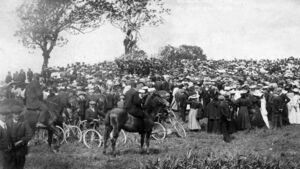Milestones risk conflating the past and the present

A crowd gathered on June 30, 1907 at the homestead where Michael Davitt was born in Straide, to mark the first anniversary of his death. The 150th anniversary of the foundation of the Land League that Davitt co-founded will be marked in 2029. Picture: Leonard Collection
The new Programme for Government contains an interesting section about upcoming commemorations. The document lists a series of significant historical anniversaries that arise during the lifetime of the government.
None of the commemorations will be as big a deal as those we saw over the last few governments. What was called the Decade of Commemorations ran from 2012 to 2023, and during that long decade we formally commemorated a number of important events in modern Irish history including Home Rule; the Lockout; World War 1; the Rising; the First Dáil and the War of Independence; Partition and the Treaty; the Civil War.
There was a lot of time and energy devoted to it. And plenty of controversy too. That’s the nature of these things. The events which will be marked over the next few years will not be as dramatic as over the past decade. They will not attract as much attention, or as much controversy, and maybe that is a good thing.
To my mind, commemorations of historical events are also something of a contradiction in terms. They use past events as their backdrop but they don’t really focus on history.
History is the study of what happened in the past, as best as it can be known. Commemorations are always about the present, and what they focus on says more about contemporary society than about the past.
Take 1916. When the Troubles was at its height, commemorations of it were very low key. Why? Because with daily sectarian killings, there was less willingness to talk of the blood sacrifice of 1916. Now that we have had many decades of relative stability in the north, we again talk about 1916 more openly, only this time more focused on the idealism than the sacrifice.
30 years ago, there was much less talk about the colonial nature of the relationship between Britain and Ireland. Now there is no end of talk about it. In both cases that will tell you more about the mid 1990s and the mid 2020s than what actually happened between Britain and Ireland over the past 850 years. How the past is viewed is decided upon by the times you live in, not by what happened in those past times.
So the new commemorations ahead will be interesting in terms of what they tell us about contemporary events and opinions in Ireland. And how they are viewed by different people with different positions will show the fault lines of today, not yesterday.
This year the 250th anniversary of the birth of Daniel O’Connell will be marked. Now O’Connell and your view on him is a bellwether. O’Connell can be the Liberator of the Irish people, or he can be a Catholic sectarian, instituting a conservative catholic dominance.
He can be the role model of how to peacefully achieve Irish national aspirations, or an example of how you let the British get their way by denying the right of resistance to them.
Depending on your view, step forward whatever Daniel O’Connell you want.
In the government commemoration he will be promoted as a European and internationally focused statesman who wanted Ireland to be free within the context of global co-operation, foreswearing violence and extremism in doing it.
Many in the government will think that is the Daniel O’Connell who is needed in 2025. With the Irish Presidency of the European Union only around the corner, you can see how ‘Daniel O’Connell’ will play a part in that. If the commemoration this year goes well, and with the European Union struggling with new and increasingly belligerent forms of nationalism, you can expect a fair few European meetings – even a summit – to be held in Derrynane House.
In 2026 we will mark the 250th anniversary of the US Declaration of Independence, highlighting, so the Programme says, ‘Ireland’s connection to that story, both north and south.’ That will make an interesting piece of history, but let’s be clear why this is in the document – the contemporary purposes are very obvious. We need to engage with an America which is likely to take decisions which are not in our interest, and reminding Americans of our shared connections might help to soften that. There will also be a need to remind an Irish audience of the noble aspects of America’s birth: a republic created to enshrine the idea that all people are created equal. With the outgoing President Biden warning Americans about the dangers of an oligarchy – rule by the wealthy few – the reason for this is all very apparent.
We also want – as part of the new Taoiseach’s ‘Shared Island’ initiative – to build linkages in our historical story, north and south. The point being that people from both sides built America.
In 2027, we will mark the birth of Hanna Sheehy-Skeffington in 1877, and the death of Constance Markievicz in 1927. These two women were undoubtedly historical figures of note, and commemorating them of course also serves the important contemporary purpose of supporting young women to both aspire and to achieve acts of significance and endeavour in their own lives.
In 2028, we will mark the centenary of the Irish pound. Contemporary events as we stand suggest that this will be a low-key affair, unless by then President Marine Le Pen of France and an AfD German Chancellor decide to abolish the Euro. That will make marking the creation of the Irish pound a contemporary challenge rather than a historical commemoration. But that couldn’t happen, could it?
In 2029, we will also mark the 300th anniversary of Jonathan Swift’s ‘A Modest Proposal’, a work that bring satire to its most extreme level. In it, Swift argued that the solution to overpopulation and poverty was that you could cook and eat babies. Swift used this image to lampoon the brutal indifference of his opponents to the suffering of others. He didn’t of course mean that anyone should take it as a real suggestion, something his readers well understood. Let’s hope that social media users don’t think this is a serious and brilliant idea, and run with it.
In another vein entirely, in 2029 we also mark a century since the opening of Ardnacrusha. The commemoration will of course actually be about alternative energy as well as an attempt by the government to argue back against the ‘failed state’ thesis which is so strongly held right now. It will also be used to show that we can build big infrastructure, though others will take the opportunity to talk about how we fail to do so while protecting biodiversity – there is no Ridge Pool near Ardnacrusha.
The ESB was also founded in 1929 and led ultimately to the rural electrification scheme of the 1940s and after. The left will use the founding of the ESB to talk about the role that large scale state enterprises should play in solving our problems. Rural electrification will be used to argue for major projects to develop the west.
Finally, in 2029, and this of local interest, we will mark the 150th anniversary of the foundation of the Land League. That will generate many arguments in favour of policies to benefit rural Ireland and the small farmer. It won’t be great for landlords. But I wonder to what extent it will make us reflect on whether the creation of so many small farms led to a conservative and under-developed west of Ireland? As with all these commemorations, that observation is not a historical point but a political question.





